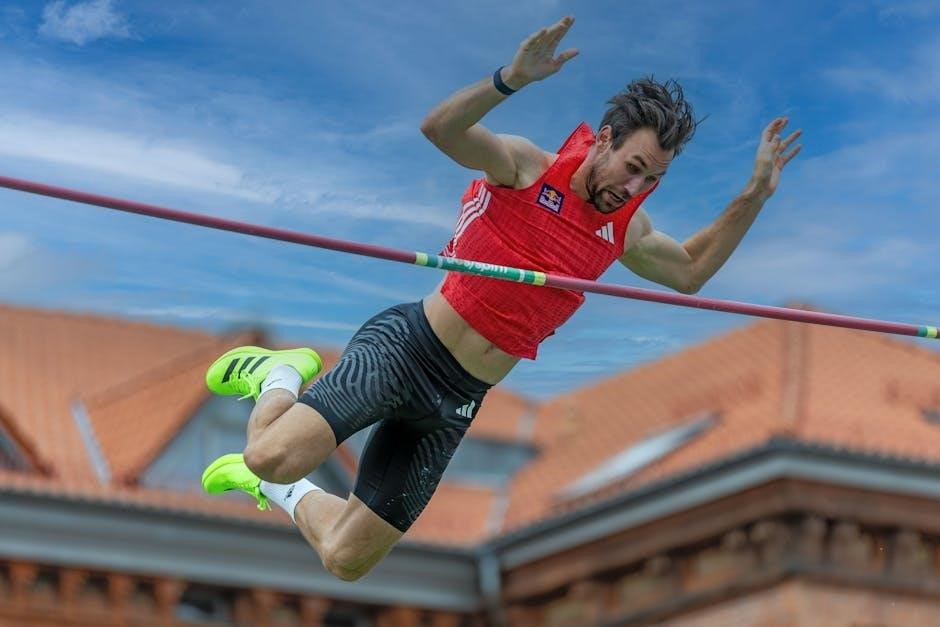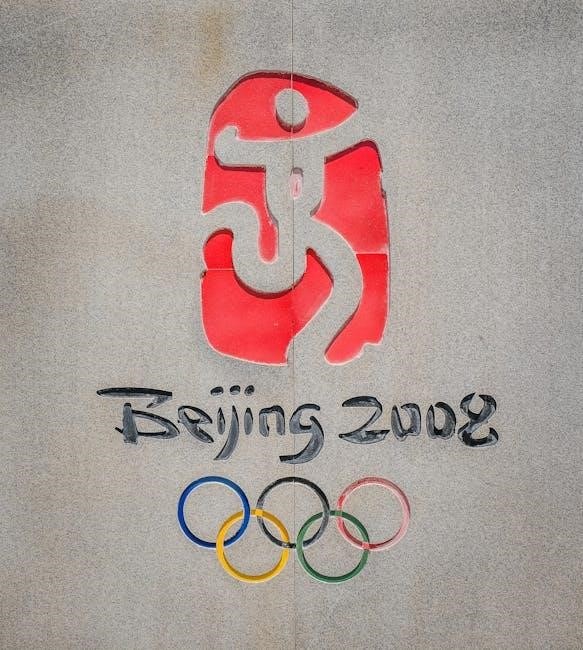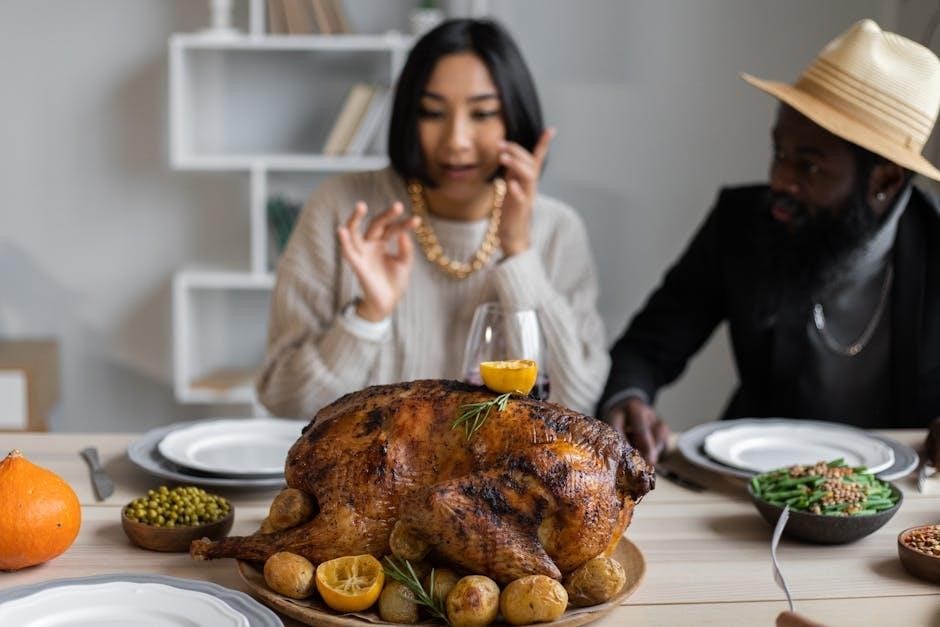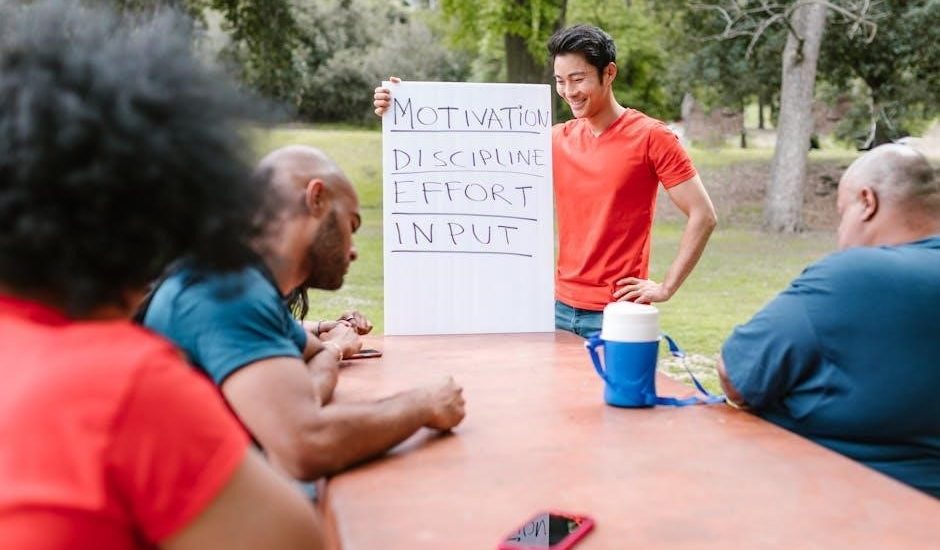The Potato Olympics is an engaging and educational event that combines creativity, teamwork, and fun. It involves students designing and competing with decorated potatoes in Olympic-style challenges, promoting numeracy, creativity, and collaboration. Perfect for all ages, it offers a unique blend of learning and play.
1.1 What is Potato Olympics?
The Potato Olympics is a dynamic and interactive educational activity designed to engage students in creative and competitive challenges. It combines learning with fun, where participants design and decorate potatoes to compete in various Olympic-style events. This unique concept transforms ordinary potatoes into athletes, encouraging students to explore numeracy, creativity, and teamwork. The activity is adaptable for all ages and abilities, making it a versatile tool for classrooms and special events.
Students participate in events such as potato rolling, bowling, and weigh-ins, fostering healthy competition and collaboration. The Potato Olympics also incorporates elements of art, science, and math, allowing students to express their imagination while developing academic skills. It is a beloved tradition in many schools, promoting engagement and joy in learning. With its blend of creativity and education, the Potato Olympics offers a memorable experience for participants of all ages.
History and Origin
The Potato Olympics originated as a creative classroom project to engage students in hands-on learning; It was devised by an innovative educator aiming to merge fun with education. Over time, it evolved into a popular, interactive event across schools worldwide, fostering both creativity and academic skills.

2.1 Background and Development
The Potato Olympics emerged as a unique blend of creativity and education, initially conceived in a classroom setting to make learning engaging and interactive. The concept was born out of the need to provide students with practical, hands-on activities that could reinforce academic concepts while fostering teamwork and problem-solving skills.
Over the years, the event evolved from a simple classroom project into a widely recognized activity, adopted by schools and communities worldwide. Its development was influenced by educators seeking innovative ways to integrate STEM, art, and physical education into a single, cohesive experience. The Potato Olympics gained popularity due to its versatility, allowing participants of all ages to engage in fun and challenging tasks centered around a humble potato.
The event’s growth was further fueled by the creation of downloadable resources, such as the “Potato Olympics Event Ideas PDF,” which provided structured guidelines and creative event ideas for organizers. This accessibility helped standardize the activity while encouraging customization to suit different audiences and settings.
Today, the Potato Olympics is celebrated for its ability to inspire creativity, critical thinking, and collaboration, making it a beloved tradition in many educational and community environments.

Event Ideas
The Potato Olympics offers a variety of fun and creative events, including individual and team-based activities. From potato races and launches to artistic displays, these events encourage creativity, teamwork, and healthy competition, making them engaging for all participants.
3.1 Individual Events
Individual events in the Potato Olympics are designed to test participants’ skills, creativity, and speed. One popular event is the Potato Sprint, where participants race to carry potatoes across a finish line using a spoon. Another fun challenge is the Potato Toss, where individuals throw potatoes into buckets from a distance. The Potato Roll involves rolling a potato downhill or across a flat surface, with the goal of reaching a target or traveling the farthest. For creativity, the Potato Sculpture event allows participants to carve or shape potatoes into unique designs, which are then judged on originality and detail. Older participants might enjoy the Potato Trivia, testing their knowledge of potato-related facts. These events encourage physical activity, problem-solving, and self-expression, making them enjoyable for all ages. They also promote healthy competition while keeping the atmosphere light and fun.
3.2 Team Events
Team events in the Potato Olympics foster collaboration and camaraderie among participants. One exciting event is the Potato Relay, where teams pass potatoes between members using spoons or small containers, with the fastest team winning. Another popular activity is the Potato Tug-of-War, where teams compete to pull a potato or potato-filled sack across a line. The Potato Obstacle Course challenges teams to work together to navigate potatoes through a series of challenges, such as tossing them into hoops or rolling them through tunnels. For a creative twist, the Potato Tower Build requires teams to construct the tallest tower using potatoes and limited materials. Teams can also participate in the Potato Quiz Show, solving potato-themed riddles or trivia questions. These events encourage communication, strategy, and teamwork while keeping the atmosphere lively and entertaining. They are perfect for groups of all sizes and ages, ensuring everyone has a chance to contribute and shine. Safety is emphasized, with soft obstacles and non-slip surfaces to prevent accidents.

3.3 Creative Challenges
Creative challenges in the Potato Olympics are designed to spark imagination and innovation. One standout event is the Potato Sculpture Art, where participants carve or shape potatoes into intricate designs or characters, with judging based on originality and artistry. Another engaging activity is the Potato-Themed Costume Design, where individuals or teams create outfits using potato sacks, peels, or other potato-related materials. The Potato Recipe Cook-Off encourages culinary creativity, as contestants prepare unique dishes using potatoes as the main ingredient. Additionally, the Potato Photography Contest challenges participants to capture the most artistic or humorous photos featuring potatoes in creative settings. These events not only showcase creativity but also highlight the versatility of potatoes as a medium for self-expression. They are perfect for fostering imagination and providing a platform for participants to think outside the box. The focus is on fun and originality, making these challenges a memorable part of the Potato Olympics experience.

3.4 Themed Events
Themed events in the Potato Olympics add a unique twist to the games, making them more engaging and fun. One popular theme is the Potato Luau, where participants dress in tropical attire and compete in events like the Coconut Potato Toss or Hula Hoop Potato Relay. Another exciting theme is the Potato Space Adventure, featuring challenges such as the Alien Potato Hunt or Space Suit Potato Race. These themed events encourage creativity and teamwork while maintaining the lighthearted spirit of the Potato Olympics. They also provide opportunities for participants to express themselves through costumes and props, adding an extra layer of entertainment. Themed events can be tailored to different audiences, making the Potato Olympics accessible and enjoyable for all age groups. By incorporating themes, the games become more dynamic and memorable, ensuring a fun experience for everyone involved.
3.5 Age-Appropriate Adaptations

Adapting Potato Olympics events to suit different age groups ensures inclusivity and fun for all participants. For younger children, simpler activities like the Potato Roll or Potato Toss can be introduced, focusing on basic motor skills and teamwork. Tweens and teenagers can engage in slightly more complex challenges, such as the Potato Relay Race or Potato Obstacle Course, which test speed, agility, and strategy. For adults, events can incorporate creativity and humor, like the Potato Sculpture Challenge or Potato Trivia, making the games entertaining and engaging for all ages. Additionally, senior participants can enjoy low-impact activities such as the Potato Bowling or Potato Guessing Game, which are easy to participate in and require minimal physical exertion. By tailoring events to age groups, the Potato Olympics become a universally enjoyable experience, fostering participation and excitement across generations.

How to Organize
Organizing Potato Olympics involves detailed planning, assigning roles, and scheduling events. Ensure materials are ready, safety measures are in place, and judging criteria are clear. Coordinate teams, communicate rules, and prepare for smooth execution of all activities.
4.1 Planning and Preparation
Planning and preparation are crucial for a successful Potato Olympics event. Start by defining the purpose and scope, whether it’s for fun, education, or community engagement. Choose a date and venue that accommodate participants and spectators comfortably. Create a detailed schedule, including setup, event timings, and teardown. Form an organizing committee to oversee different aspects like event coordination, participant registration, and prize distribution. Delegate tasks clearly to ensure accountability and efficiency. Develop a checklist for pre-event preparations, such as arranging tables, tools, and potatoes. Plan for signage, audio equipment, and seating if needed. Conduct a trial run or rehearsal to identify potential bottlenecks. Ensure all participants understand the rules and objectives beforehand. Consider weather conditions if hosting outdoors and have a backup plan. Budgeting is also essential; allocate funds for materials, prizes, and refreshments. Finally, promote the event through flyers, social media, or local announcements to attract participants and spectators. A well-planned event guarantees a smooth and enjoyable experience for everyone involved.
4.2 Materials and Supplies Needed
Organizing a Potato Olympics requires gathering the right materials and supplies to ensure smooth execution. Start with an ample supply of potatoes in various sizes for different events. Measuring tools like rulers, stopwatches, and scales are essential for accurate scoring. For creative events, craft supplies such as paint, markers, glue, and construction paper are necessary. Safety gear like gloves and protective eyewear should be available for events involving tools or heavy lifting. Tables, chairs, and storage bins are needed for setup and organization. Signage, banners, and printed rule sheets will help guide participants and spectators. For team events, materials like ropes, balance beams, or small obstacles may be required. A sound system or megaphone can help with announcements. A registration desk with forms, pens, and name tags will streamline participant check-in. Prize materials, such as medals, certificates, or small tokens, should be prepared for winners. Lastly, a first-aid kit and cleaning supplies are important for safety and post-event cleanup. A well-stocked event ensures everything runs smoothly and everyone has a great time. A checklist can help organizers track all necessary items.
4.3 Safety Considerations
Safety is a top priority when organizing a Potato Olympics event. Ensure that all participants, especially children, are supervised by adults during activities. Clear the playing area of any hazards or obstacles to prevent trips or falls. For events involving tools, such as carving or cutting potatoes, provide safety gloves and ensure participants handle utensils carefully. Soft, lightweight materials should be used for throwing or tossing events to minimize the risk of injury. Establish clear rules for each activity to avoid accidental collisions or misuse of equipment. A first-aid kit should be readily available, and organizers should be trained in basic first aid. For team events, emphasize teamwork and caution to prevent overexertion or accidents. Weather conditions, such as wet surfaces, should be monitored to avoid slips. Lastly, ensure that all participants are aware of the safety guidelines before starting the event. By prioritizing safety, everyone can enjoy the fun and creativity of the Potato Olympics without incidents. Proper planning and precautions will help create a secure and enjoyable environment for all. Safety should never be overlooked to ensure a successful event. Potatoes are fun, but safety always comes first. Preparing for potential risks ensures smooth execution. Always double-check the setup and rules with participants; A safe event fosters a positive experience for everyone involved. potato olympics event ideas pdf
4.4 Judging Criteria and Scoring
Judging criteria and scoring are essential to ensure fairness and transparency in the Potato Olympics. For individual events, participants can be scored based on accuracy, speed, and creativity. In team events, teamwork, coordination, and overall performance are key factors. Creative challenges, such as potato carving or themed displays, should be judged on originality, detail, and adherence to the theme. Themed events may also include points for costumes or presentation. To maintain consistency, create a scoring rubric with predefined categories and point ranges. For example, accuracy could be worth up to 10 points, while creativity could be worth up to 5 points. Judges should be trained to evaluate fairly and provide constructive feedback. In case of ties, a sudden-death round or audience vote can be used to determine the winner. Ensure all participants understand the judging criteria beforehand to avoid disputes. A clear scoring system will make the event more enjoyable and competitive. Providing a detailed scorecard for each participant or team can also add to the fun and transparency of the competition. This approach ensures everyone knows how they are being evaluated. potato olympics event ideas pdf

Educational Value
The Potato Olympics offers numerous educational benefits, fostering numeracy through scoring, creativity in design, and teamwork during collaborative events. It also encourages problem-solving, strategic thinking, and self-expression, making it a fun and engaging learning experience for all participants. potato olympics event ideas pdf
5.1 Numeracy and Math Skills
The Potato Olympics is an engaging way to develop numeracy and math skills through fun, hands-on activities. Participants practice measurement by calculating distances in events like the “Potato Launch” or “Potato Toss,” while scoring systems enhance understanding of basic arithmetic operations. Timing races and counting laps in relay events introduce concepts of time management and sequencing. Data collection and comparison of results encourage analytical thinking, helping participants grasp mathematical relationships and patterns. These activities make math accessible and enjoyable, fostering a strong foundation in essential numerical skills for all ages. potato olympics event ideas pdf

5.2 Creativity and Self-Expression
The Potato Olympics serves as a vibrant platform for fostering creativity and self-expression, allowing participants to showcase their unique talents and imaginations. Events like the “Potato Sculpture Challenge” encourage artistic exploration, where individuals can transform raw potatoes into intricate designs or characters. Similarly, the “Potato Costume Design” activity prompts participants to craft creative outfits using potatoes as the central theme, blending fashion with humor. These activities not only highlight individual creativity but also provide an outlet for self-expression, as participants can interpret challenges in their own distinctive way. The freedom to innovate and experiment with unconventional materials like potatoes inspires participants to think outside the box and explore their artistic side. This aspect of the Potato Olympics makes it a fun and engaging way to nurture creativity while celebrating the humble potato. potato olympics event ideas pdf

5.3 Teamwork and Collaboration
Teamwork and collaboration are essential components of the Potato Olympics, fostering camaraderie and shared achievement among participants. Events such as the “Potato Relay Race” and “Potato Tug-of-War” require coordinated effort, encouraging teams to strategize and work together to succeed. In the “Potato Tower Challenge,” participants must collaborate to build the tallest possible structure using potatoes and limited materials, promoting problem-solving and communication. These activities emphasize the value of teamwork, as individuals rely on each other’s strengths to achieve common goals. The Potato Olympics also includes “Potato Passing Relays,” where teams pass potatoes in creative ways, reinforcing trust and coordination. Such events not only entertain but also strengthen interpersonal bonds and mutual respect. By encouraging group participation, the Potato Olympics highlights how collaboration can lead to fun and memorable experiences. This focus on teamwork makes the event inclusive and engaging for all ages. potato olympics event ideas pdf


